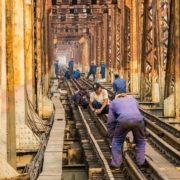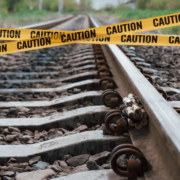The Importance of Prompt Medical Care After a Railroad Injury
Railroad workers face unique hazards daily, from heavy machinery to unpredictable environmental conditions. When an injury occurs on the job, prompt medical care is essential for both recovery and protecting legal rights. Timely medical attention is vital for ensuring fair compensation and documenting the extent of injuries.
Why Prompt Medical Care Matters for Railroad Workers
In the aftermath of a railroad injury, time is of the essence. Delaying medical treatment can worsen your physical condition and jeopardize your ability to secure compensation under laws like the Federal Employers Liability Act (FELA). Here are some key reasons to prioritize immediate medical care:
- Health Preservation: Rapid treatment ensures injuries are properly diagnosed and treated, preventing complications like infections or permanent disabilities.
- Legal Documentation: Medical records serve as essential evidence in injury claims, demonstrating the severity and timing of the harm.
- Compliance with Reporting Deadlines: FELA and other regulatory frameworks often require timely reporting of injuries, supported by medical documentation.
Railroad injuries can arise from various circumstances, including train derailments, equipment failures, and hazardous working conditions. The need for quick and comprehensive medical care cannot be overstated.
FELA and Your Legal Protections
The Federal Employers Liability Act (FELA) provides railroad workers with the right to seek compensation for workplace injuries caused by employer negligence. Unlike workers’ compensation, FELA requires proving fault, making medical records and expert testimony critical to your case.
Protections Under FELA
- Coverage for All Railroad Employees: Whether you’re injured in a train collision or slip and fall on the tracks, FELA applies.
- Compensation for Various Damages: Workers can recover costs for medical treatment, lost wages, pain, and suffering.
- Right to Choose Your Doctor: Under FELA, you’re not limited to an employer-approved medical provider.
Steps to Take After a Railroad Injury
Taking the right steps immediately after a railroad worker accident can safeguard both your health and your legal rights. Here’s what to do:
Seek Immediate Medical Attention
- Visit the nearest emergency room or your preferred healthcare provider.
- Be honest about the circumstances of your injury and ensure all symptoms are documented.
Report the Incident
- Notify your supervisor or employer as soon as possible.
- Obtain a written copy of the injury report for your records.
Preserve Evidence
- Take photos of the accident scene, your injuries, and any contributing hazards.
- Collect contact information for witnesses.
Consult an Attorney
- Contact a lawyer experienced in FELA cases to guide you through the claims process and protect your rights.
Common Challenges in Railroad Injury Cases
Pursuing compensation under FELA can be complex. Here are some challenges you may encounter:
- Proving Employer Negligence: Unlike no-fault workers’ compensation, FELA requires evidence of employer fault, such as unsafe working conditions or defective equipment.
- Resistance from Employers and Insurers: Railroad companies often have legal teams dedicated to minimizing payouts.
- Delays in Medical Treatment: Any gap in seeking care can be used to argue that your injuries are not as severe as claimed.
Legal Deadlines and Reporting Requirements for Railroad Injuries
Under FELA, you typically have three years from the date of the injury to file a claim. However, internal employer policies may require reporting injuries within a much shorter timeframe. Failing to report promptly can jeopardize your case.
Why Timing Is Critical
- Preserving Evidence: Over time, accident scenes can change, and witness memories can fade.
- Strengthening Credibility: Delayed reports and treatment may lead to questions about the legitimacy of your claim.
For railroad workers, timely action ensures compliance with both state-specific guidelines and federal regulations, providing a stronger foundation for your case.
Critical Safety Tips for Railroad Workers
Railroad work comes with inherent risks, but following proper safety protocols can significantly reduce the likelihood of injuries. Here are some essential tips for staying safe on the job:
- Wear Appropriate Safety Gear: Always use personal protective equipment (PPE), including helmets, gloves, and reflective clothing. This gear can protect you from head injuries, burns, and other accidents.
- Stay Aware of Your Surroundings: Railroad environments are dynamic, with moving equipment and heavy machinery. Keep your focus sharp and avoid distractions like smartphones.
- Adhere to Safety Guidelines: Familiarize yourself with your company’s safety policies and ensure compliance. This includes understanding how to safely operate equipment and handle hazardous materials.
- Report Hazards Immediately: If you notice unsafe conditions, such as faulty equipment or spills, report them to your supervisor right away.
- Work as a Team: Effective communication with coworkers can prevent accidents. Use signals and established protocols to coordinate activities, especially during maintenance or heavy lifting tasks.
For railroad workers, following these tips can create a safer work environment and minimize the risk of injuries that disrupt lives and livelihoods.
How Railroad Workers Can Access Post-Injury Support
Recovering from a railroad injury involves more than medical care; it requires comprehensive support to help workers return to normalcy. Here are resources and steps to consider:
Rehabilitation Services
Many injuries sustained on the railroad, such as back or joint trauma, may require physical therapy. Seek specialized rehabilitation programs that cater to the unique needs of industrial workers.
Financial Assistance Programs
In addition to FELA claims, explore financial assistance options like short-term disability benefits or workers’ compensation (if applicable) to cover immediate expenses.
Emotional and Psychological Support
Serious injuries can lead to stress, anxiety, or depression. Consider reaching out to counseling services or support groups for emotional well-being.
Legal Representation
Navigating the aftermath of an injury can be overwhelming. Partnering with an experienced FELA attorney ensures your rights are protected and you receive the compensation you deserve.
By leveraging these resources, injured workers can address both the physical and financial challenges associated with their recovery.
Potential Outcomes of FELA Claims
Successful FELA claims can provide compensation for:
- Medical Expenses: Both past and future treatment costs.
- Lost Wages: Including future earning potential.
- Pain and Suffering: For physical and emotional distress.
- Punitive Damages: In cases of gross employer negligence.
Protect Your Rights After a Railroad Injury: Contact Burge & Burge, PC Today
At Burge & Burge, PC, we understand the unique challenges faced by railroad workers. Our experienced attorneys are committed to providing personalized representation, helping you navigate the complexities of FELA claims, and ensuring you get the support you need during recovery. If you or a loved one has been injured in a railroad accident, don’t wait to take action. Contact us today for a free consultation and take the first step toward protecting your health and your future.
👉 FRSA Whistleblower Protection
👉 Documenting Your Railroad Worker Injury: Why Every Detail Matters
👉 How Will My Railroad Medical History Affect My FELA Claim?
👉 What are the Types of Past and Future Damages Covered under FELA?
👉 Comparative Negligence in FELA Cases: What It Means for Alabama Railroad Workers
👉 How Understaffing in the Railroad Industry Affects Worker Safety












Leave a Reply
Want to join the discussion?Feel free to contribute!